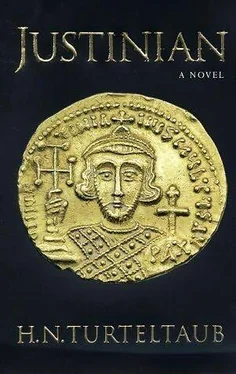Harry Turtledove - Justinian
Здесь есть возможность читать онлайн «Harry Turtledove - Justinian» весь текст электронной книги совершенно бесплатно (целиком полную версию без сокращений). В некоторых случаях можно слушать аудио, скачать через торрент в формате fb2 и присутствует краткое содержание. Жанр: Историческая проза, на английском языке. Описание произведения, (предисловие) а так же отзывы посетителей доступны на портале библиотеки ЛибКат.
- Название:Justinian
- Автор:
- Жанр:
- Год:неизвестен
- ISBN:нет данных
- Рейтинг книги:3 / 5. Голосов: 1
-
Избранное:Добавить в избранное
- Отзывы:
-
Ваша оценка:
- 60
- 1
- 2
- 3
- 4
- 5
Justinian: краткое содержание, описание и аннотация
Предлагаем к чтению аннотацию, описание, краткое содержание или предисловие (зависит от того, что написал сам автор книги «Justinian»). Если вы не нашли необходимую информацию о книге — напишите в комментариях, мы постараемся отыскать её.
Justinian — читать онлайн бесплатно полную книгу (весь текст) целиком
Ниже представлен текст книги, разбитый по страницам. Система сохранения места последней прочитанной страницы, позволяет с удобством читать онлайн бесплатно книгу «Justinian», без необходимости каждый раз заново искать на чём Вы остановились. Поставьте закладку, и сможете в любой момент перейти на страницу, на которой закончили чтение.
Интервал:
Закладка:
"Sooner or later, you'll tell me. Why not now?"
Myakes took no notice of my irritability, and, in fact, cured it with half a dozen words: "Emperor, he cut off his nose."
My hand went of itself to the scarred wound I bore. "He did what?" I said, and then held up my hand. "No, don't say it again. I heard you. Truly God is a just judge. That comes closer than anything I could have imagined to tempting me to forgive Apsimaros for stealing the throne that belongs to me. I don't forgive- I'll never forgive- but I am tempted."
"He's ruling under the name Tiberius," Myakes reminded me.
That made me shrug again. "He's sitting on my throne. No reason he shouldn't steal a name that belongs to my family, too."
As a matter of fact, though, now that I think on it, my clan had also borrowed the name Tiberius, taking it from the Emperor who ruled just before Maurice and who was, in the days of my great-great-grandfather, a man of good reputation. How and why that Tiberius came to bear his name, I cannot say, he being the first Roman Emperor to carry it since the one in whose reign our Lord was crucified.
"His brother, I hear, is named Herakleios," Myakes said. "Whether that's his real name or one he's put on, I couldn't tell you."
I vaguely remembered that Apsimaros had had a brother who was an officer of some sort. For the life of me, I could not remember what that brother's name had been; in no way had he distinguished himself. Apsimaros wo uld undoubtedly promote him to high rank anyhow: if a man could not rely on his own brother, he could rely on no one. Remembering how little my father had been able to rely on his brothers, I felt relying on no one the better choice.
Then I looked over at Myakes. Had I not relied on him, had I not had him upon whom to rely, I would surely have died not long after my exile began. But comparing Myakes to my ambitious uncles was comparing figs and fingers. Myakes was in no position to supplant me, no matter what he did. Apsimaros would always have to keep one eye on his Herakleios, just as my father had had to watch his brothers Herakleios and Tiberius, just as I would have had to watch my brother Herakleios had he lived.
I said, "I pray to God, Myakes, that Leontios has no one to look after him as you looked after me when I needed you most."
He grunted; I'd succeeded in embarrassing him. "Emperor, I've been taking care of you about as long as I've been a man," he answered after a pause for thought. "I've been doing it so long, I'd hardly know how to do anything else."
He seemed to feel about it the same way I felt about the throne: the one was his destiny as the other was mine. But he was luckier than I, for his calling, unlike mine, had suffered no interruption.
Time went on. I never abandoned the hope and intention of regaining my throne, but I had no luck building any sort of force to help me do it. My only new recruit besides the aforementioned brothers, Barisbakourios and Stephen (or, as I have said, Salibas, he answering impartially to both), was a gigantic fisherman named Paul, who was as strong as any other two men I have ever seen. Unfortunately, what God had given him in bulk, he took away in wit, with the result that the fisherman was often called- though seldom to his face- Moropaulos, Foolish Paul.
Carthage remained in Arab hands. Apsimaros, having been part of the fleet that failed to reclaim it, must have regarded it as a lost cause. In the east, though, he beat back an attack by the followers of the false prophet, and that frontier, being the gateway to Anatolia and to the imperial city itself, is more vital for the Roman Empire.
By the news that slowly dribbled into Kherson, Apsimaros displayed more energy on the throne than had Leontios. That this is less than the highest of praise, I freely admit; a dead man would have found it difficult to display less energy than had Leontios.
In the year following his successful defense of Roman territory, Apsimaros sent into exile Bardanes, sometimes called Philippikos, consigning him to the island of Kephallenia. Reckoning this upon my fingers, I find that it must have been in the fourth year of Apsimaros's usurpation, which was the seventh year of my exile. The more I think on it, the more incredible it seems, and yet I am convinced it is accurate.
"What did Bardanes do?" I asked the traveling jeweler who gave me the news.
"Story is that he dreamt he had an eagle shading his head, and was stupid enough to say so in front of somebody who took word to the Emperor," the fellow answered.
"That was stupid," I agreed. From time out of mind, the eagle has been the symbol of Roman power and, by extension, of the imperial dignity. No wonder Apsimaros exiled him; he had as much as claimed he would be Emperor one day.
In the next year, the Arabs under Azar attacked Kilikia. Apsimaros's brother drove them back to their own lands with heavy losses. The Armenians also rebelled against the Arabs whom Sabbatios had installed as their overlords. Apsimaros sent men to help them, but the deniers of Christ proved stronger there, driving out the Romans, regaining the territory that had rebelled, and burning alive a good many of the Armenian grandees who had risen up against them.
I know I heard this story in detail far more circumstantial than I recount here, but count myself lucky to remember any of it at all. Sitting not far from the sailor who was spinning it was a small, thin, brown man with wavy black hair and features of almost feminine delicacy. During my time in exile, I had learned that such men came from distant India.
They did not often come from distant India, however; in those seven years, I had seen no more than half a dozen. Thus I looked at this fellow with some considerable interest. Perhaps men from India also come to the imperial city from time to time. If they do, however; they do not come to the grand palace; before my forced journey to Kherson, I had seen never a one.
The man from India also stared at me. I had grown resigned to that from children and strangers, the general run of Khersonites having by then accustomed themselves to my appearance. But the Indian's stare was different from those of many seeing me for the first time: curious, not horrified.
After a bit of staring, that curiosity got the better of him. Picking up his cup of wine, he came over to me as I stood in front of the bar, whereupon, pointing a brown finger at the center of my face, he asked, "Why do you look like that?" His Greek was not very good, and flavored by a singsong accent unlike any I had heard before. He certainly did not know enough of the language to be polite.
"Why do I look like this?" I repeated, to be sure I understood him. He nodded. He being a barbarian, I thought him also a fool, and gave back the sort of answer I should have offered to a Roman twit who put such a question to me: "I lost my nose somewhere, and don't know where to find it."
That got a laugh from the drinkers who heard me. The little man from India, though, nodded again, as if what I had said made perfect sense. "If you want," he said, "I build you new one."
"Oh, splendid," I said. "Will you make it of clay, so that I can paste it onto my face?" I won another laugh with that sally. I laughed myself, bitterly. One winter, the second or perhaps the third I was in Kherson, I had taken a knife and carved a nose out of wood, taking pains to let no one, not even Myakes, know what I was about. Rather than pasting it to my face, I had attached it by means of a cord tied round my head. When it was done, I carried it off to a rain puddle (again making sure no one saw me), donned it, and examined my reflection. My opinion of the result may be inferred from the fact that I never wore it again.
Once more, however; the man from India, rather than giving up or growing angry- as I was certainly beginning to do- replied as if to a serious question: "Oh, no, very much no. I make from flesh of you."
Читать дальшеИнтервал:
Закладка:
Похожие книги на «Justinian»
Представляем Вашему вниманию похожие книги на «Justinian» списком для выбора. Мы отобрали схожую по названию и смыслу литературу в надежде предоставить читателям больше вариантов отыскать новые, интересные, ещё непрочитанные произведения.
Обсуждение, отзывы о книге «Justinian» и просто собственные мнения читателей. Оставьте ваши комментарии, напишите, что Вы думаете о произведении, его смысле или главных героях. Укажите что конкретно понравилось, а что нет, и почему Вы так считаете.












